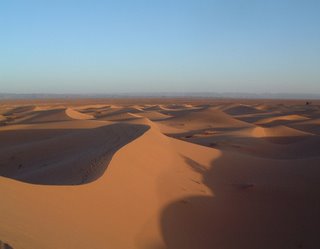
August has rolled around again, and with it comes readings about bread. Today, we are treated to Elijah in the wilderness, contrasted with the "Bread of Life" discourse from John's gospel.
Elijah the prophet is on the run from Queen Jezebel. The story comes quick on the heels of Elijah's great success on Mount Carmel, in which he bested 450 prophets of Baal by being the one on whose sacrifice fire rained from heaven. Not one to leave any job unfinished, Elijah ordered that his opponents be caught and executed. Now, Jezebel swears to do to Elijah what he did to her prophets. Elijah flees to the desert, leaving his servants partway, and continuing alone. His hysteria and panic have caught up to him. He is alone in a place where survival is an iffy prospect in the best of times. Now that he is being hunted by the entire army, he is about to give up, and prays for God -- the author of his life -- to take that life away.
Rather than to grant his wish, God sends Elijah a messenger, or angel, in a dream. The angel twice rouses the prophet and feeds him bread and water -- enough to sustain Elijah on a long journey to Mount Horeb, where he will encounter God. But that's a reading for another Sunday.
Elijah has been no shrinking violet. He has confronted the powerful, and is paying the price for telling them the truth. Though exhausted, hungry and despairing, he receives the strength he needs to take him to the next step in his journey.
In the gospel reading, John uses a favorite literary device that puts a discourse into Jesus mouth that Our Lord probably never uttered, but which contains deep truths about him and his identity. Jesus tells us that he is the bread that came down from heaven, and that those who eat this bread will never die. The manna or bread that nourished the Israelites after their escape from Egypt was meant only to save their bodies, and it did its work for the forty years that Israel wandered the desert. But the bread that Jesus gives is his own flesh, whose effect is not the survival of the body, but eternal life.
The parallels with the Elijah story are many, and they are quite beautiful. Elijah is strengthened in adversity by bread that comes from God's own messenger. Sustained by this bread, he is enabled to travel to his destination in Horeb, where God awaits to reveal himself. Jesus gives us his flesh as bread, nourishing us on our own journey, whose destination is also an encounter with God.
We Catholics tend to simultaneously overvalue and undervalue the Eucharist, which is the continuation of John’s insight into the nature of the bread given by Christ. We overvalue it by fetishizing it, becoming paranoid about its precise ingredients and valuing the ability of the communion host to break without creating particles. But we also undervalue it, taking for granted its power in our lives to transform us and to nourish us on our way. How many of us choose not to receive on Sunday? Or to take daily Mass as a standard and unremarkable facet of our day? Are we, as Saint Paul asks, eating worthily of the bread, becoming cognizant of the gift that Christ gives us? Or do we consider the Eucharist as a spiritual gas station, making the reception oft he gift of the Eucharist into little more than a business transaction?
Christ, who sees deeply into our hearts, knows the limitations of our worship. Always ready to forgive and to teach, he continues to accompany us on our journey of faith. May we return the favor of his gift by pondering it closely in our hearts, by asking for this nourishing bread to transform our hearts and make us more capable to reach our heavenly destination. May this bread that we eat, in Saint Paul's words, heal the bitterness, fury, anger, shouting, reviling and malice from our hearts, revealing the compassion and forgiveness that our in our grasp, and in the model of our Savior. Amen.

No comments:
Post a Comment